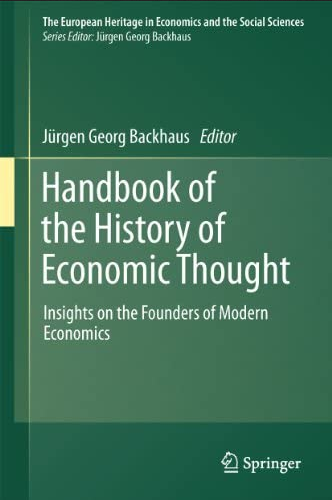Newly released
This book is new and will be uploaded as soon as it becomes available to us and if we secure the necessary publishing rights.

Handbook of the History of Economic Thought: Insights on the Founders of Modern Economics Book PDF
(0)
Author:
Juergen BackhausNumber Of Reads:
72
Language:
English
Category:
Social sciencesSection:
Pages:
741
Quality:
excellent
Views:
1523
Quate
Review
Save
Share
Book Description
This reader in the history of economic thought challenges the assumption that today’s prevailing economic theories are always the most appropriate ones. As Leland Yeager has pointed out, unlike the scientists of the natural sciences, economists provide their ideas largely to politicians and political appointees who have rather different incentives that might prevent them from choosing the best economic theory. In this book, the life and work of each of the founders of economics is examined by the best available expert on that founding figure. These contributors present rather novel and certainly not mainstream interpretations of the founders of modern economics.
The primary theme concerns the development of economic thought as this emerged in the various continental traditions including the Islamic tradition. These continental traditions differed substantially, both substantively and methodologically, from the Anglo-Saxon orientation that has been dominant in the last century for example in the study of public finance or the very construct of the state itself. This books maps the various channels of continental economics, particularly from the late-18th through the early-20th centuries, explaining and demonstrating the underlying unity amid the surface diversity. In particular, the book emphasizes the writings of John Stuart Mill, his predecessor David Ricardo and his follower Jeremy Bentham; the theory of Marginalism by von Thünen, Cournot, and Gossen; the legacy of Karl Marx; the innovations in developmental economics by Friedrich List; the economic and monetary contributions and “struggle of escape” by John Maynard Keynes; the formidable theory in public finance and economics by Joseph Schumpeter; a reinterpretation of Alfred Marshall; Léon Walras, Heinrich von Stackelberg, Knut Wicksell, Werner Sombart, and Friedrich August von Hayek are each dealt with in their own right.
Juergen Backhaus
Jürgen Backhaus is a German liberal scholar and author. He teaches at the University of Erfurt. He has written primarily on finance and the economic analysis of law. He completed his university studies at the University of Konstanz, Germany, and at Auburn University. He obtained his Ph.D in economics at Constance in 1986 with a thesis titled Co-Determination: A Legal and Economic Analysis. He also spent a year at the Center for Study of Public Choice in Virginia. Between 1980 and 1986, he taught in the Department of Economics at Auburn University in the United States. From 1986 to 2001, he taught financial sciences at the University of Maastricht. At the same time, he is a visiting professor at the Robert Schumann University in Strasbourg. He wrote many works, in particular on the German historical school. He has also collaborated with the Independent Institute.
Book Currently Unavailable
This book is currently unavailable for publication. We obtained it under a Creative Commons license, but the author or publisher has not granted permission to publish it.
Rate Now
5 Stars
4 Stars
3 Stars
2 Stars
1 Stars
Handbook of the History of Economic Thought: Insights on the Founders of Modern Economics Quotes
Top Rated
Latest
Quate
Be the first to leave a quote and earn 10 points
instead of 3
Comments
Be the first to leave a comment and earn 5 points
instead of 3